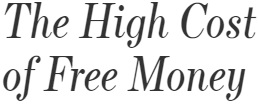Some people argue the government should give everyone a “basic income.”
The problem with that approach (and the problem with other types of redistribution) is that some people will choose not to work if they can simply rely on handouts from the government.
That’s not good for the overall economy because total output is determined by the quality and quantity of labor and capital being utilized.
Some supporters of basic income claim that basic income would not discourage work.
They point out that giving the handouts to everyone would solve the problem that exists with most forms of redistribution, which is punitive, implicit marginal tax rates if recipients try to become self-sufficient.
It would be great to solve that problem, but I’m skeptical that basic income would be a net positive.
Let’s review some new evidence about no-strings handouts. Allysia Finley of the Wall Street Journal summarized the key findings of some new academic research.
Did pandemic stimulus payments harm lower-income Americans? That’s the implication of a new study by social scientists at Harvard and the University of Exeter. Liberals argue that no-strings-attached handouts encourage better financial decisions and healthier lifestyles. …The Harvard study put this hypothesis to the test and found the opposite.During a randomized trial conducted from July 2020 to May 2021, researchers assigned 2,073 low-income participants to receive a one-time unconditional cash transfer of either $500 or $2,000. Another 3,170 people with similar financial, demographic and socioeconomic characteristics served as a control group. …The top-line result: Handouts increased spending for a few weeks—on average $26 a day in the $500 group and $82 a day in the $2,000 group—but had no observable positive effect on any individual outcome. …Handout recipients fared worse on most survey outcomes. They reported less earned income and liquidity, lower work performance and satisfaction, more financial stress, …and anxiety than the control group.
The main takeaway is that redistribution does not work. It’s bad for taxpayers and it is bad for recipients.
But I fear our friends on the left will not learn any lessons.
These findings contradicted the predictions of 477 social scientists and policy makers the researchers surveyed. That’s not surprising. Most liberal academics and politicians believe government handouts are the solution to all problems. If transfer payments were a ticket to the middle class, the War on Poverty would have succeeded long ago. …It’s no surprise that people who received a large percentage of their monthly income for doing nothing were less motivated to work and less satisfied with their work.
Very true. The so-called War on Poverty certainly showed government is capable of redistributing money.
But it has not produced good results, at least if one values economic independence and self-sufficiency for the less fortunate.
P.S. Ms. Finley’s column also mentioned another study that found a negative link between food stamps and diet quality.
…the study isn’t a one-off in documenting a link between transfer payments and worse outcomes. A 2018 study in the Journal of the American Medical Association examined the diet quality of food-stamp beneficiaries from 2003 to 2014, a period in which average benefits increased more than 50%. Similar low-income people who didn’t get food stamps ate more healthily than those who did. The non-food-stamp group consumed significantly fewer sugar-sweetened beverages, and their diets improved more over time.
P.P.S. Finland experimented with basic income and decided it did not work, while Swiss voters overwhelmingly rejected a scheme for universal handouts in their country.
P.P.P.S. Joe Biden expressed skepticism about basic income back in 2017, but that did not stop him from proposing per-child handouts after taking office.
———
Image credit: Steven Depolo | CC BY 2.0.


